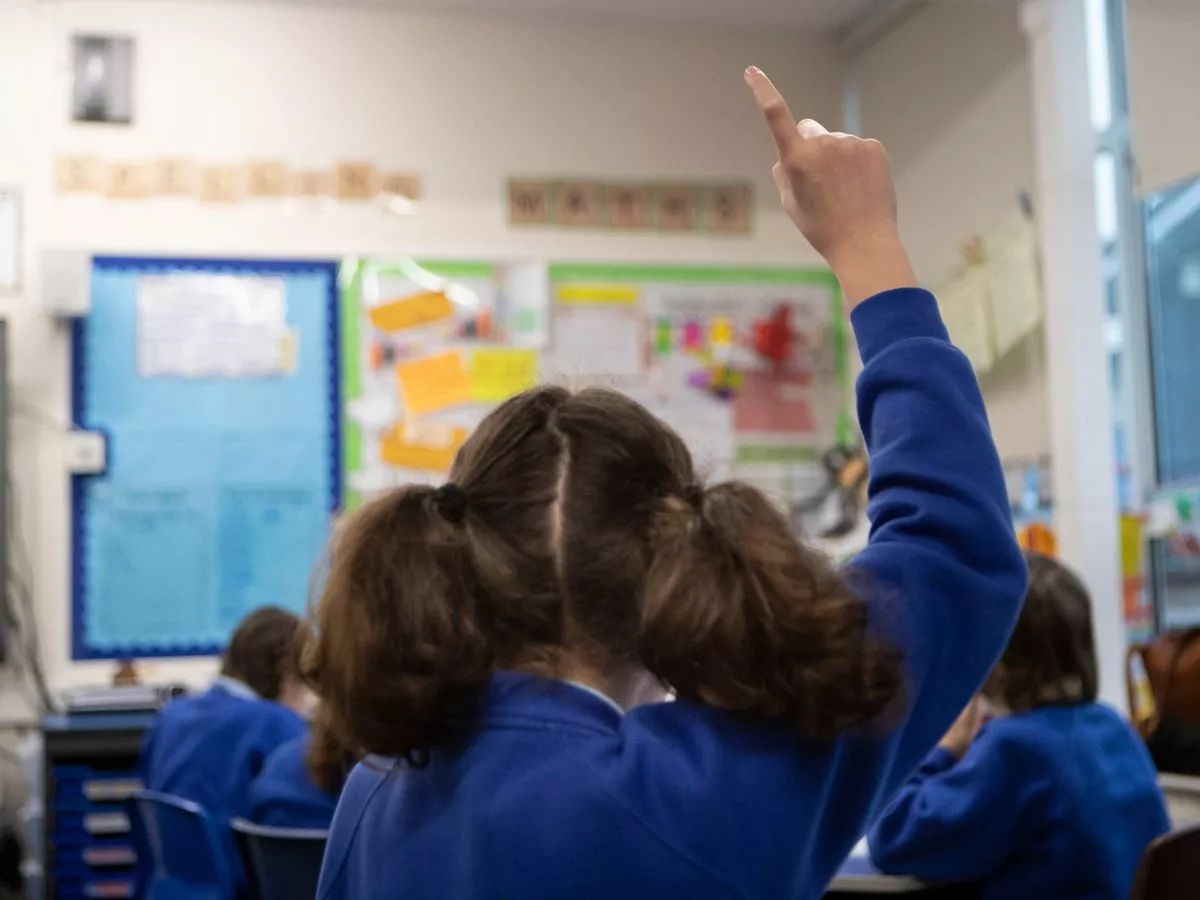Copyright manchestereveningnews

The world has changed dramatically since the national curriculum was last updated more than a decade ago. Now the government has announced a number of key reforms to make it easier for school children to 'achieve and thrive in the modern world'. Among the many issues youngsters have to navigate is the threat of fake news and disinformation. There is now a plan is to help them 'develop the critical thinking needed to challenge what they see and protect them from online harms'. Recognising that children are now consumers often before they reach secondary school, primary pupils will also learn more about the fundamentals of money. Join our Family WhatsApp group HERE Responding to the recommendations of Professor Becky Francis’s Curriculum and Assessment Review, the changes come 11 years after the last update and are a core part of the government's bid to deliver the Prime Minister's target of two thirds of young people participating in higher-level learning by age 25, ensuring they have the skills needed to get on in life. The government says the confirmed steps will ensure every young person 'has a cast-iron grip' on the basics of reading, science and maths, alongside the knowledge and skills required for life and work over the next decade – raising school standards and boosting opportunity under the Plan for Change. Among the steps being taken will be a new statutory reading test in Year 8 and a strengthening of writing assessment in year 6 to spot pupils who need extra support at a crucial point in their development. Currently around one in four children leave primary school without being able to properly read and too many are leaving school without passing their GCSE English. The new Year 8 test will pinpoint those who could benefit from further stretch, while repairing falling standards in the 'lost years' at the start of secondary, when too many working-class young people fall behind. Under the new arrangements, arts GCSEs will be given equal status to humanities and languages, 'recognising their value in boosting confidence and broadening skills for a competitive job market'. To complement this, a new core enrichment entitlement will offer all pupils access to civic engagement, arts and culture, nature and adventure, sport, and life skills to build resilience and opportunity. Schools will also be expected to work towards offering triple science GCSE as standard, which comes alongside the government exploring a new qualification for 16-18 year olds in data science and AI – helping more young people succeed in the science and tech careers that power our economy. Education Secretary Bridget Phillipson said: “It has been over a decade since the national curriculum was updated, and it’s more crucial than ever that young people are equipped to face the challenges of today, so they can seize the exciting opportunities that life has to offer. “The path to our country's renewal runs through our schools - they must be an epicentre of the strongest possible foundations of knowledge, and the skills to excel in the modern world. “From the fundamentals of reading to the present danger of spotting fake news, as part of our Plan for Change, these landmark reforms will help young people step boldly into the future, with the knowledge to achieve and the skills to thrive as the world around us continues to rapidly evolve.” The government will publish a new oracy framework to ensure more young people become confident and effective speakers, building on the success of the reading and writing frameworks, and help teachers strengthen their teaching of oracy through practical tips, tried-and-tested strategies and examples of best practice. With evidence showing that increased participation in extra-curricular activities is associated with higher academic outcomes, the government is also setting out a new core enrichment entitlement, so that every child – wherever they go to school – has access to sport, the arts and more. The government will publish a new set of enrichment benchmarks with schools asked to ensure every child has access to activities across five categories of enrichment. Ofsted will consider as part of routine inspection how this expectation is being met, with information also made available to parents through a new information service – school profiles. The new curriculum update, set to be taught from September 2028, has been welcomed by unions, but they've questioned how it will be implemented when education funding is inadequate and schools are already struggling to recruit specialist teachers. Pepe Di’Iasio, general secretary of the Association of School and College Leaders, said: “The curriculum and assessment review has delivered on its promise of evolution rather than revolution with a sensible, evidence-based set of reforms. We’re pleased to see recommendations which will modernise the curriculum for a changing world without creating an unmanageable burden on an education workforce which is already under great strain. “However, delivering a great curriculum also requires sufficient funding and teachers, and the government must step up to the plate and ensure that schools and colleges have the resources they need. This is not currently the case and the government only last week signalled an even tighter financial squeeze on schools in evidence to the pay review body where it made clear that it will not fund the full costs of national teacher pay awards over the next three years." Di’Iasio said the Education Secretary has 'randomly announced' this new set of enrichment benchmarks to be added to the many expectations over which schools are judged, 'without a word about how this will be resourced'. "The stark reality is that many schools have had to cut back extracurricular activities because government funding is so desperately inadequate," he said. “We welcome the curriculum and assessment review’s recommendations to reform Key Stage 2 tests, scrap the English Baccalaureate performance measure, and reduce the excessive amount of time students spend sitting GCSE exams. We have called for reforms in these areas for a number of years. “We agree with the proposed entitlement for every student to be able to study triple science. There is, however, a significant practical issue which needs to be overcome to enable all schools to be able to deliver this expectation. Many schools are struggling with severe difficulties in recruiting subject specialist science teachers. "This is particularly the case in physics where postgraduate recruitment into initial teacher training is dire. We look forward to discussing with the government how we will ensure we have enough subject teachers to deliver this expectation." He said that the recommendation to make citizenship mandatory in primary schools also 'requires careful consideration over how this would be resourced and accommodated within busy timetables'. “We welcome the review’s recommendation on proposed maths and English tests in Year 8 being diagnostic rather than a test which ends up being used as an accountability measure to judge schools," he said. "This should be something that is about helping to support young people in these vital subjects. It should not be used as yet another way to beat schools over the head. “However, we are confused by the fact that the government has already announced plans for a mandatory Year 8 reading test before the outcome of the curriculum and assessment review, and we do not agree with its plans to share the results of these tests with Ofsted.” Others have welcomed the reform, including Sir Hamid Patel CBE, chief executive of Star Academies, who said: "The government's response to the Curriculum and Assessment Review shows principled determination to build on the very best practice that has been developed by schools. It spurs ambition and innovation while recognising the increasingly complex challenges faced by the sector. "The demands that reform places on teachers have been acknowledged, with a sensible implementation timeline and signposting of reputable sources of support." And Jane Gratton, deputy director of public policy at the British Chambers of Commerce, said: "It is essential that every young person finishes their education with the knowledge and skills to move successfully into working life. “Business will welcome curriculum changes that improve employability - such as team working, oracy, literacy, digital and financial skills. It’s crucial that every student can access an appropriate qualification pathway to help keep them engaged – and in education or work. “With business, education providers and government working together – we can ensure our future workforce is ready for the challenges and opportunities ahead." The move towards a core enrichment entitlement has been praised by Ruth Marvel OBE, chief executive of The Duke of Edinburgh’s Award, who says the positive impact of such activities for pupils is clear. “We are delighted that the government has pledged to create a new enrichment entitlement," she said. "This is a watershed moment that will ensure every pupil, no matter their background, can experience an enriched education and have equitable access to the activities and experiences that engage, inspire and develop, as a complement to the academic curriculum. “At DofE we see every day the positive impact enrichment opportunities have on young people and their communities: they boost confidence and essential life skills, develop independence and social capital, improve wellbeing and resilience, and support belonging, school attendance and attainment. "We look forward to continuing to work with government to make the vision of an enrichment entitlement a reality for all.” What do you think about the planned changes to the national curriculum? Do you think the changes are needed? Let us know your views in the comments



